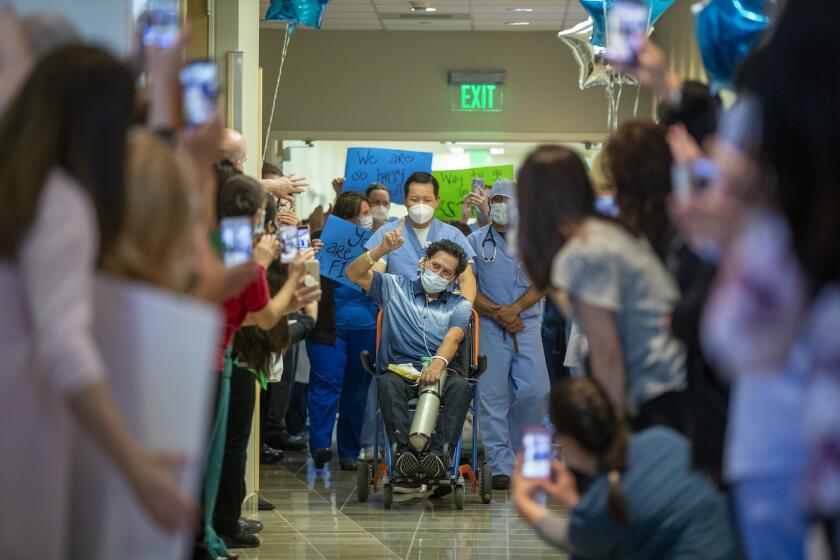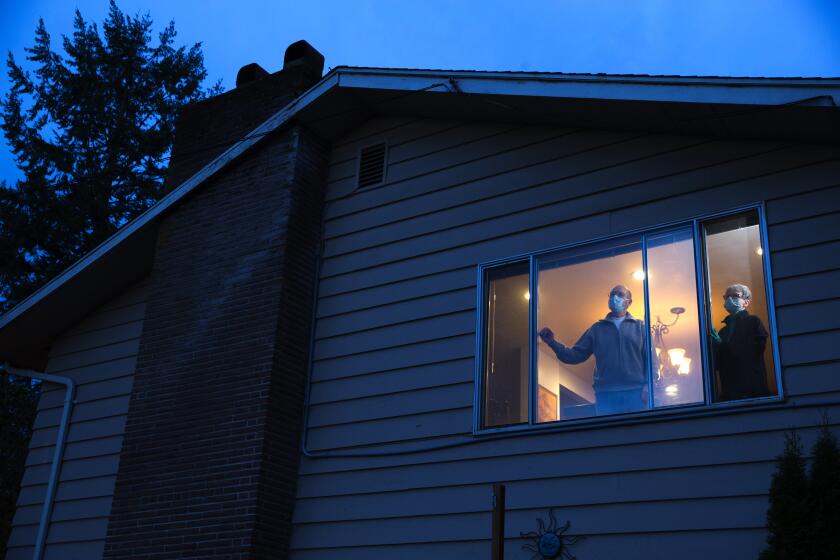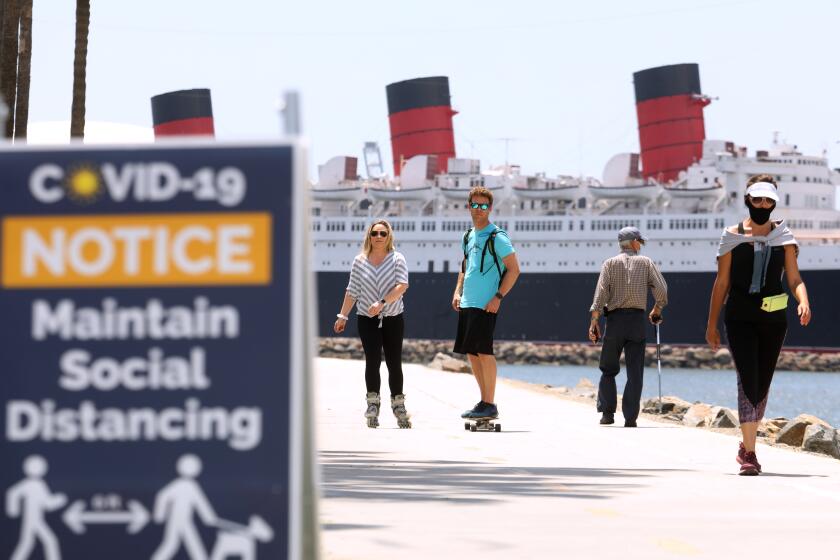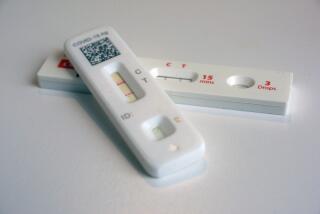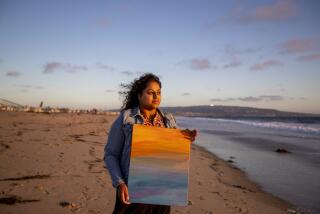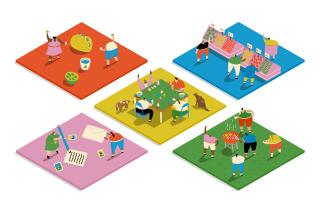I have the coronavirus and hope you’ll act like you have it too
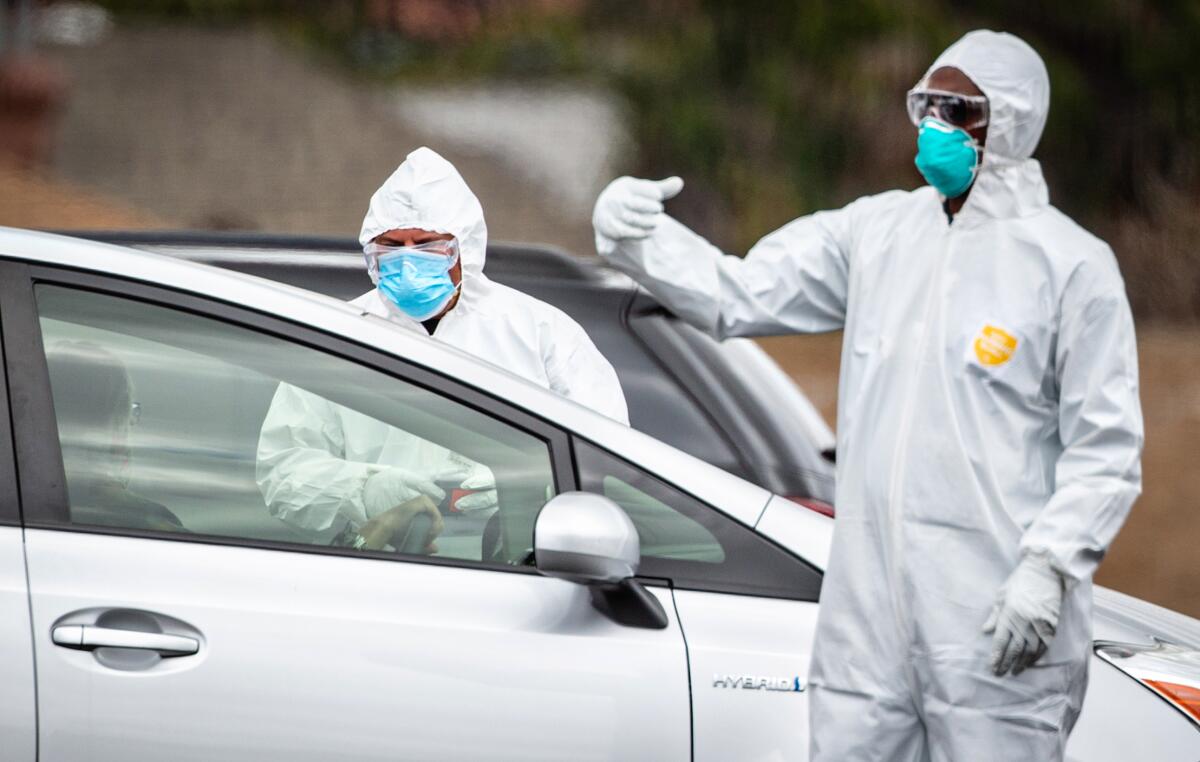
- Share via
I realized quite suddenly while making soup two Mondays ago that I couldn’t smell anything. Not the pan full of chopped onions, the herbs or any of the use-what-I-have ingredients dumped in from my fridge.
I had started feeling sick a few nights before and already decided to self-isolate completely in my apartment until I felt better, but hadn’t been that worried. My cough was wet, so I figured it was just a cold. But this was different, and matched what I’d read could be an early sign of COVID-19.
These are some of the unusual new scenes across the Southland during the coronavirus outbreak.
That’s the nature of this disease — it can be merely uncomfortable or potentially deadly, but for many, confirmation begins with this deceptively simple, irrefutable symptom.
At least once a day, I warmed up another bowl of my grab-bag soup and wondered if it was somehow miraculously delicious, or so terrible as to be barely edible. Who could know? I was alone in my apartment, and my sense of taste and smell had vanished.
Sign up for Essential California
The most important California stories and recommendations in your inbox every morning.
You may occasionally receive promotional content from the Los Angeles Times.
I wouldn’t go in for a test until that weekend, after talking to a doctor on the phone, but the lack of taste and smell acted as confirmation even before the positive test result.
I have been extremely lucky. I have felt pretty awful — an intense cough and body aches, consistent low fever, sore throat, headaches and a strong desire to lie back down on the rare occasion that I’m not already horizontal in bed — but for me, the virus has basically been akin to a bad cold or flu. I don’t have any underlying conditions and have yet to develop any medically serious symptoms.
I write a daily California newsletter for The Times. My job is basically to summarize what just happened every morning for our readers, and help them make sense of it. I take great pride in trying to flesh out the connective tissue between stories, and explain why they matter in the context of the bigger picture and larger forces at play.
But I’ve often felt bad at my job during this pandemic. How can anyone wrap their heads around the entirety of this crisis, let alone write a pithy morning news summary explaining it?
Many experts believe that this surge in new infectious diseases is being driven in part by some of humanity’s most environmentally destructive practices.
There is too much devastation and potential devastation unfolding on every possible front. It would be impossible to hold all of it at once.
And that was even before my head started to get cloudy. Things grew increasingly foggy throughout that first week, when I was still working. I found myself losing my train of thought, and often staring at a paragraph wondering if I’d already written something similar the day prior.
Because of the newsletter, I typically get a high volume of reader emails. But they became more frequent and desperate as the days wore on, with people reaching out with heartachingly specific queries — how to help a sick family member who had been refused treatment, how to get food to an elderly person in quarantine, how to know whether they would be evicted if they couldn’t pay their rent.
Some were questions I could Google, ask around on or find something useful to pass back from our previous coverage. But others just took me down a long rabbit hole, marooned on my couch in a panic, searching through complicated official guidance that made little sense to a reporter trained to make sense of it, let alone the layperson who’d asked in the first place. It is a strange thing, to have an infinite scroll of information but so few answers.
I didn’t even respond to some emails, because I didn’t know what to say or whom to ask or how to possibly help this single person when the sheer volume of total suffering is enough to break every scale. I knew that this wasn’t my job, that I am a reporter and not a social worker, but all the ordinary rules felt thrown out the window in this moment of collective emergency. When I’d wake up coughing and sweating in the night, the unanswered emails were what looped through my head.
I continued to heat and reheat ladled-out portions from the giant vat of soup in my Koreatown apartment, wondering if, like that old saying about a tree falling in the woods, it matters one way or another how soup tastes if the person eating it can’t tell the difference.
Two Tuesdays ago, I drove across town to my parents’ house to pick up a thermometer and bag of cold medicine that they set out in their frontyard.
Sounding like a petulant teenager, I screamed “Get back” and “Don’t come any closer to me!” as they stood at least 10 feet away in front of their door. And then I broke down in tears, standing a few yards away in front of my car, and told them over and over again how much I love them. I am 30 years old.
The virus itself is a doozy, even with a best-case scenario version like mine. You get a little better and then you get a little worse. A few days ago, after nearly a week off work, I thought I had finally turned the corner. That night, I got lightheaded getting out of a hot bath and passed out walking back to my room.
I’m not entirely sure what happened. Suddenly I was on the floor, with my face and knees badly banged up. But I had somehow made it past the sharp edges of the dresser and every other variation where this becomes a much darker story. I was remarkably intact.
I felt incredibly brittle and unbearably lucky, which is how I have felt most of the time, as this gloom settled in over us all.
Obviously it’s impossible to know for sure, but based on the people I was with who also became sick, I believe that I was exposed to the virus three weekends ago. I started feeling sick two weekends ago. The math there is very simple: There was at least a week after I had been exposed when I didn’t know what was creeping through my cells.
I am a careful person who has taken this virus seriously since long before the radical disruption of our lives. I do not see sunshine on the horizon. I wore gloves and tied a bandanna around my face most of the times I went out that week, before I had any symptoms or reason to think I would be sick.
I went on a socially distant hike with a few friends, staying more than six feet apart at all times. (This was light years ago in coronavirus time — before not just the park restrictions and closures, but even the trail crowding.) I also bought groceries that week, or at least tried to find some things on largely bare shelves. And I dropped things off for people who needed them.
Needless to say, in hindsight I am terrified.
I think I was careful; I know I was careful. But until that blessed 14-day mark since I’d last seen people passed, I played every prequarantine interaction over in my head a thousand times, as if each was the line-of-contagion scene from a horror movie. Who had I endangered ? Who would they endanger? And how far could that terrible line extend?
Here is the worst part, the part that is against all the better angels of our nature, the part that makes this disaster so unlike all the other disasters that we Californians know in our bones: Almost every act of kindness can put other people more at risk.
I say this not to signal virtue as I list a few measly semi-decent acts, but because I think when it comes down to it, nearly all of us have a similar urge to help. And so I hope to help drill this into other people’s heads: Any of us might already have it and be asymptomatic, or presymptomatic.
Nearly all of these small horror movies I was playing in my head began with the best of intentions: stopping to talk to the woman ringing up my groceries, to thank her and say I hoped she was holding up OK. Putting a few pairs of plastic gloves in Ziploc bags to give to friends and colleagues who needed them; leaving three rolls of toilet paper in a bag on the doorstep of a neighbor who had been having trouble finding it and was almost out.
I was well at the time, but I put on gloves to take all of these things out of their boxes and put them into plastic bags in my apartment.
At least I’m 99.9% certain I wore gloves every time. But what about the time before that, when I was just reaching into the box to grab my own toilet paper roll or a pair of gloves for myself? What if I coughed, what if I sneezed? You know the answer to these questions. You likely already have your own horror movies rolling as soon as you close your eyes.
Every time I stopped to talk to someone that week, even and always at a quote-unquote social distance, I could have put them at risk. I want desperately to be someone who recognizes other people’s humanity in a pandemic, who looks people in the eye and shares a tiny small kindness. But we all know that I was, by necessity, not six feet from the woman ringing up my sad array of canned beans, and there was not a protective shield between us at the neighborhood grocery store where I talked to her as I slid my credit card into the machine. Nor was I six full feet away from the neighbors who would check in as one of us walked to the trash or laundry in our building.
If you are someone whose response to a world in disarray is to turn your gaze outward and see how you can help, I’m not suggesting you harden your heart. That’s the last thing any of us should be doing. But please, if you are young and healthy and still able to go out for essential errands and assist others, act at all times as if you already have the virus. Because you very well might. And in a worst-case scenario, you could be endangering the very people you aim to help.
How can the new coronavirus affect people so differently — killing some while leaving others blissfully unaware that they have been infected at all?
At a moment when every reality feels tragic and absurd, there is little hope of understanding the entirety of anything, let alone making sense of it. The best any of us can do is act with intention and care, as we try not to lose the thread in our own lives.
And as for me and the virus? It’s day 17, and I’m getting better, though I still have a low fever and bad cough. I’m well enough to try to write again, but I’m used to being in the business of answers. And those still seem a very long way off.
More to Read
Sign up for Essential California
The most important California stories and recommendations in your inbox every morning.
You may occasionally receive promotional content from the Los Angeles Times.
